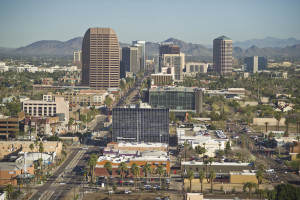Should Phoenix exist? What a dangerous question. I love it.
Zócalo Public Square and the ASU College of Public Service and Community Solutions launch a community conversation with the “Should Phoenix Exist?” prompt. The event June 2 at the Heard Museum features former Phoenix Mayor Terry Goddard and New York University professor Andrew Needham, author of “Power Lines: Phoenix and the Making of the Modern Southwest” and Sarah Porter, director of the Kyl Center for Water Policy at the ASU Morrison Institute.
“Even before climate change had the world worrying about sustainability, Phoenix was plagued by air pollution and rising temperatures,” marketing material for the event says. “What environmental, economic, social, and political forces transformed Phoenix into a metropolis? And does such a metropolis belong in the middle of the Arizona desert?”
The dangers in questions that ask us to justify our existence are the reactions to it. To have eyes roll or glaze over in places like the Legislature, Governor’s Office or Phoenix City Hall is as dreadful as the righteous indignation from those who think they know what’s best for Phoenix based on a light finger on its pulse.
Goddard seems ready to defend the city’s honor.
“I seem to get thrown into situations where professors from New York University – they’re all NYU people — decide that Phoenix is unsustainable and should be eliminated, and this is simply the latest,” Goddard said.
“I remember (in 2011) there was a professor there who wrote a book called “Bird on Fire” that caused a forum to be held. (Grady Gammage Jr. wrote a response to that book) … But it was interesting, you know. People stood up and said, ‘No we’re doing fine.’ And then the professor had a view to the contrary largely based on average rainfall — basically saying you use a lot more water than you get annually through rainfall so you must not be sustainable. And so then you have to go through a lecture on water management and long-term foresight. I think there are lots of reasons to criticize Phoenix but that’s not one of them. We sprawled and that’s not sustainable. We’ve got a lack of public transit and that doesn’t allow us to maximize our capacity, the list goes on.”
Which is why the “Should Phoenix exist?” question is a good one. It’s the opportunity to bring a long history of success and failure to the forefront as we plan for continued growth and a healthy, respectful existence in a desert environment.
The danger is that beyond the event panelists preparing to have this conversation there isn’t a broad understanding of the leadership and public policies that got us this far, particularly among people charged with securing the future of our metropolis — the very people most likely to roll their eyes at the question. Long-term planning hasn’t been a hallmark of leadership at any level during the last decade or so. That’s going to rise up to bite us more than the musings of academics.
Having this conversation also carries a risk that naysayers will win the debate. They’ll speak with a clear, authoritative voice in a language that discerning businesses and venture capitalists understand. Who wants to invest in a place experts say has no future and leaders can’t argue effectively — with actions not just words — to the contrary?
“All of these things get attention,” Goddard said. “And as we go into the water crisis, which is happening right now, it’s going to be easier for people on the outside to say, ‘Oh you’re failing because the secretary has declared that there is a shortage on the river’ and that makes everything else look far more dire.”
So, then should Phoenix exist?
